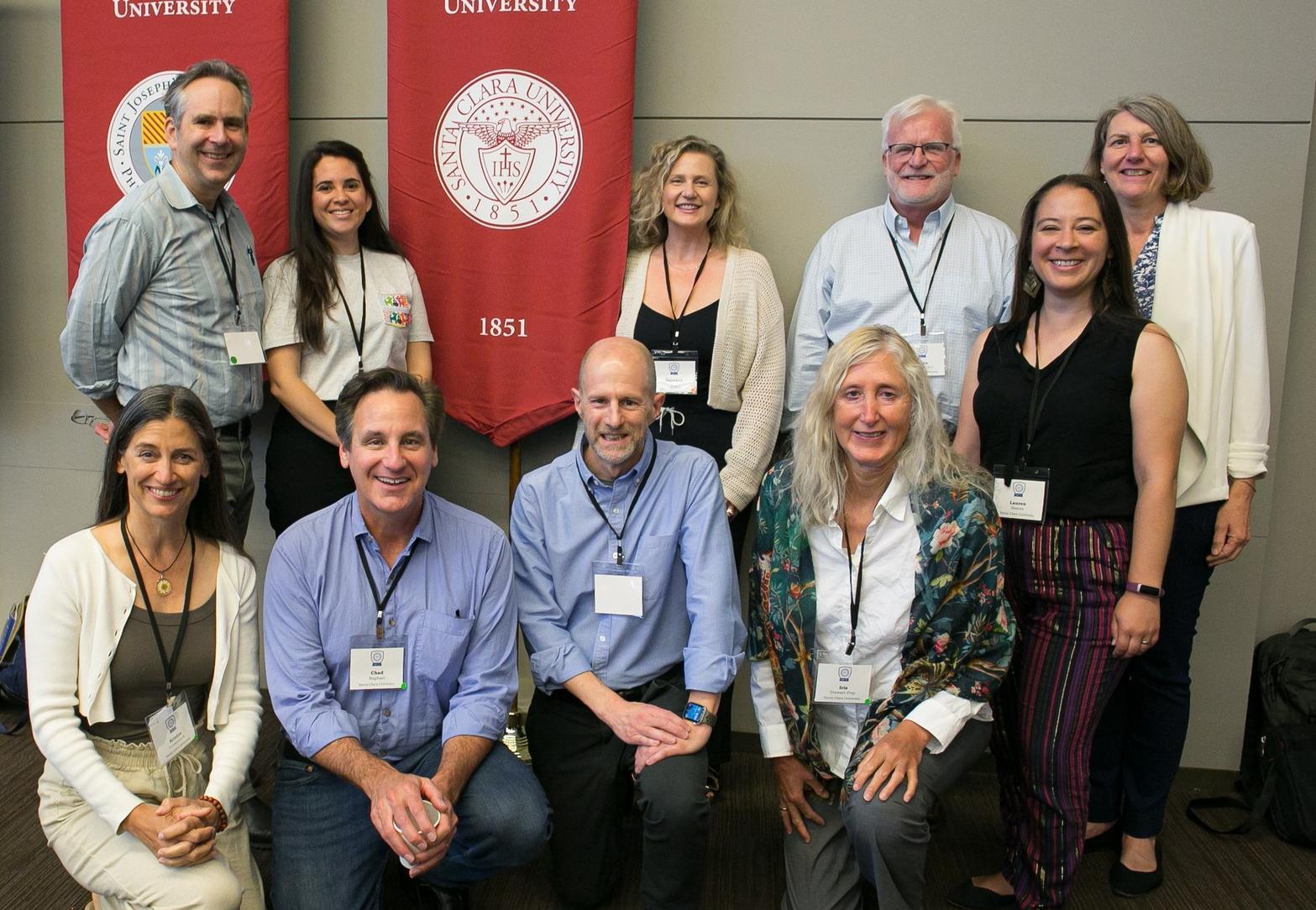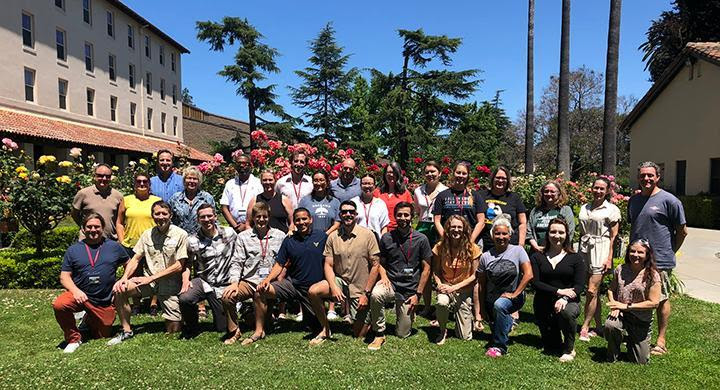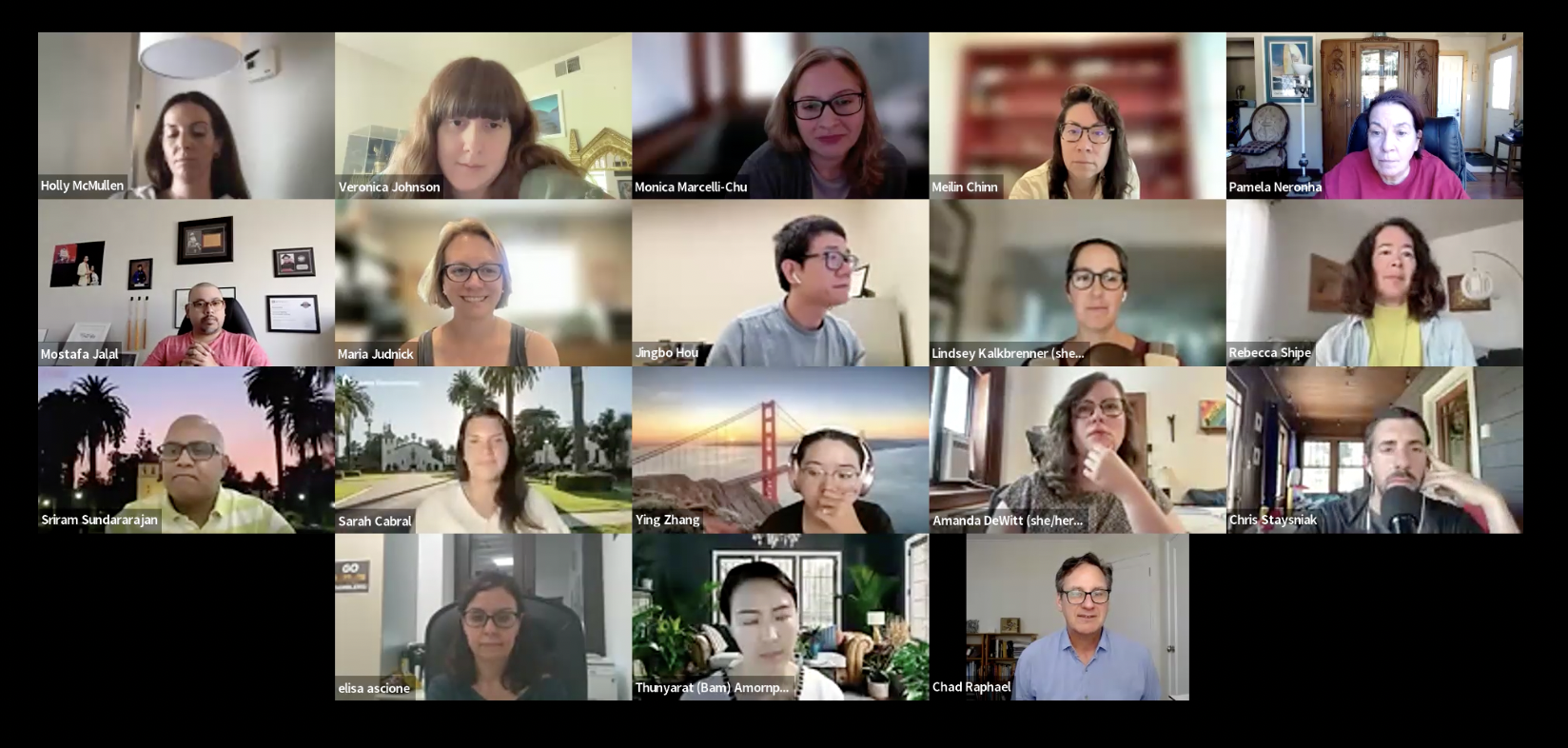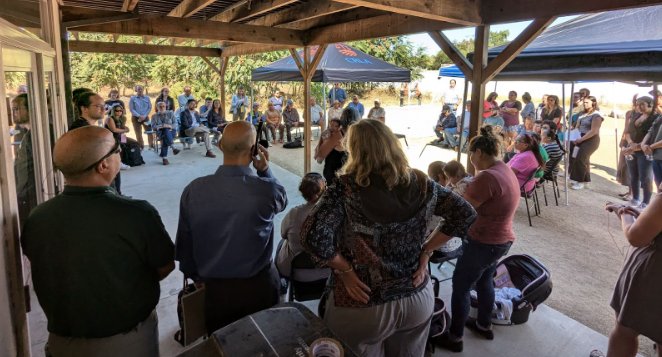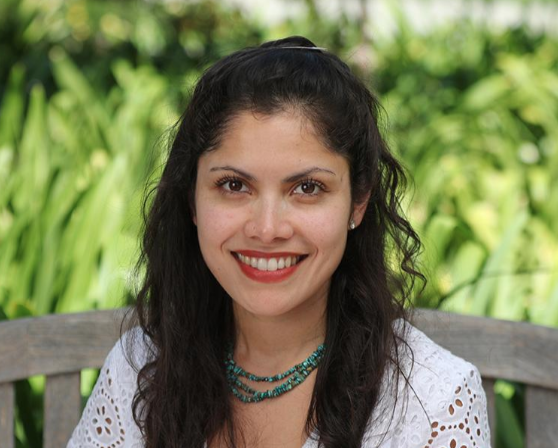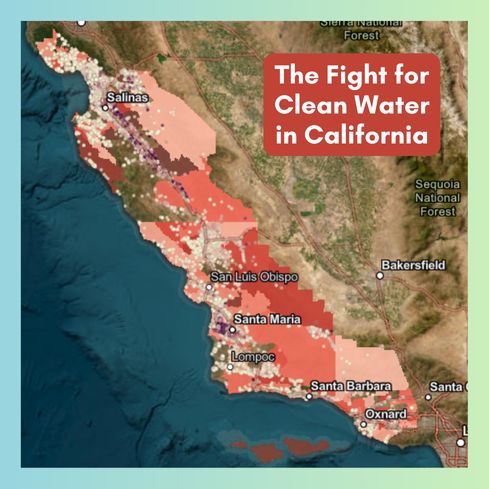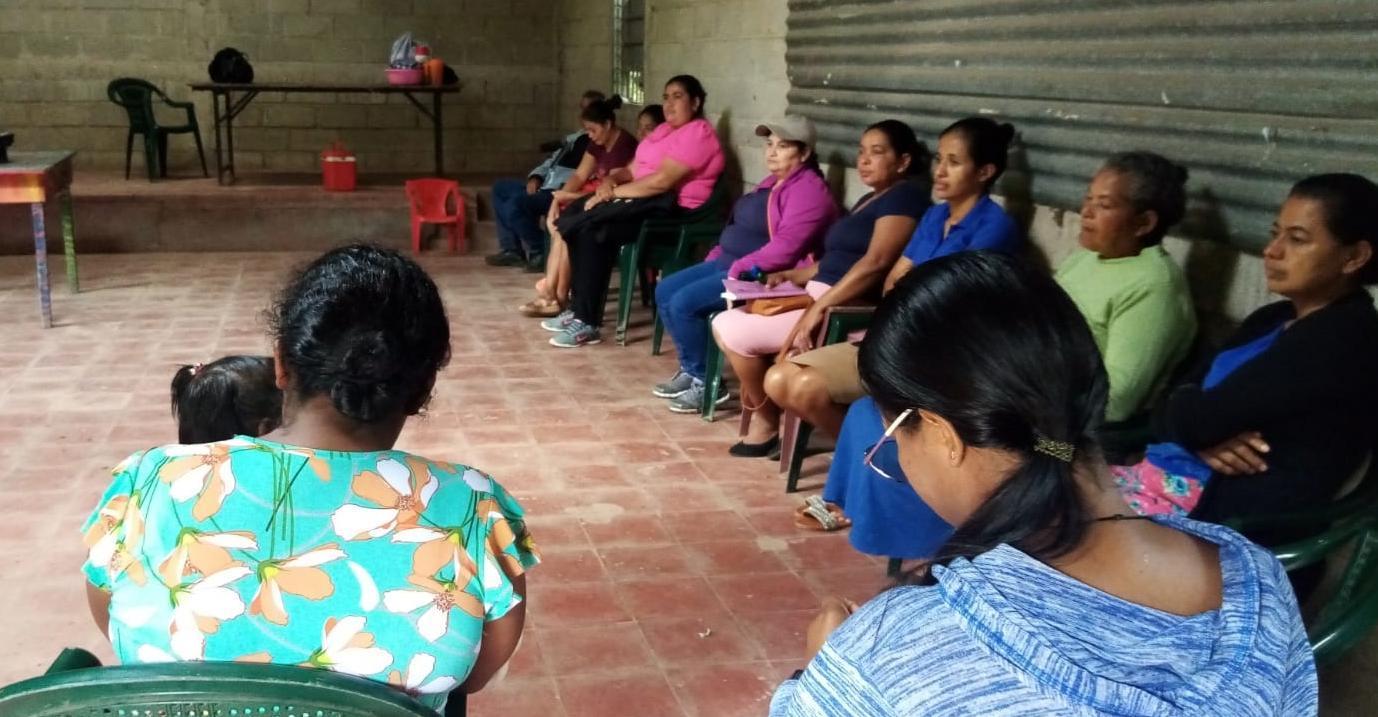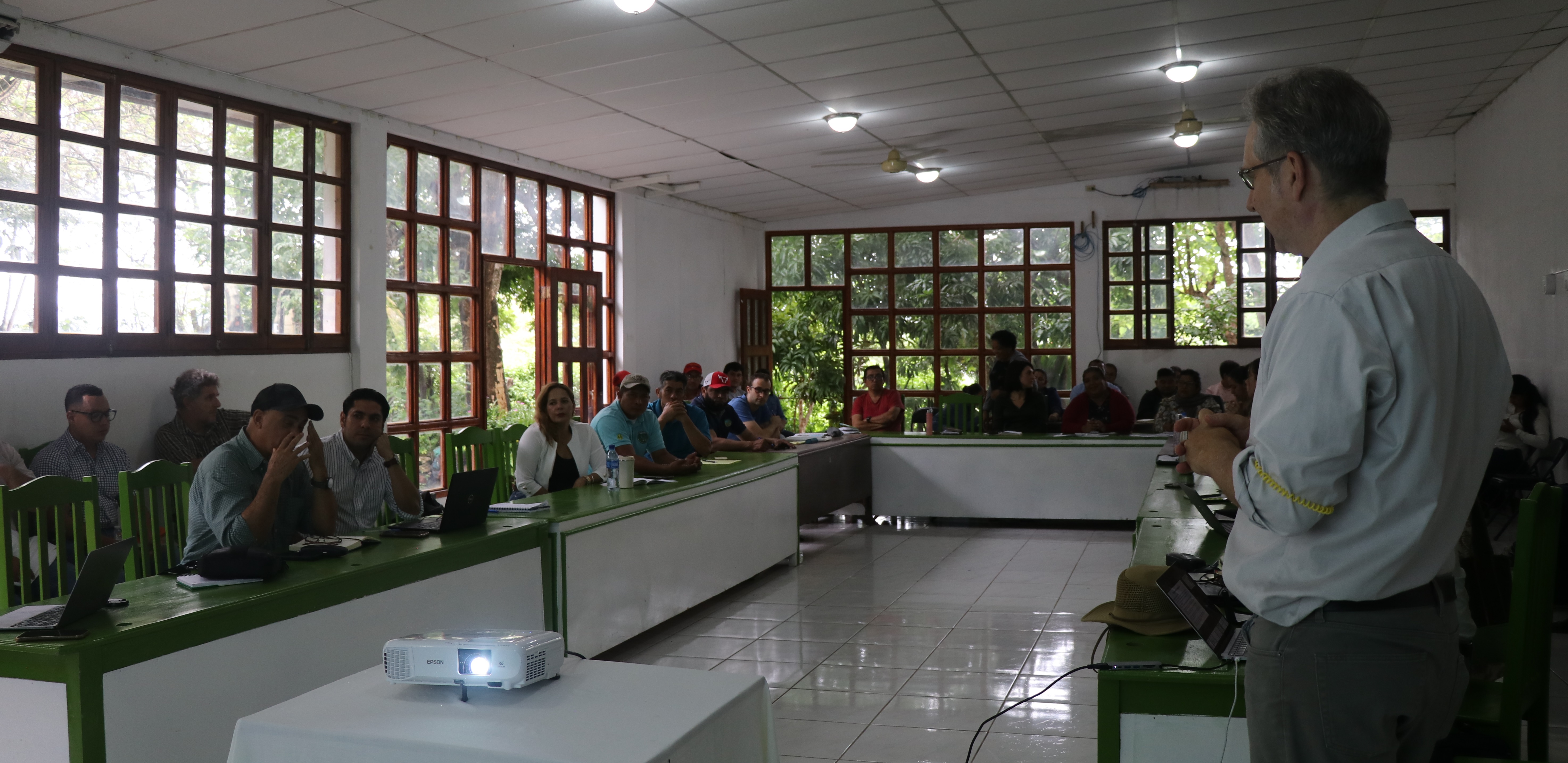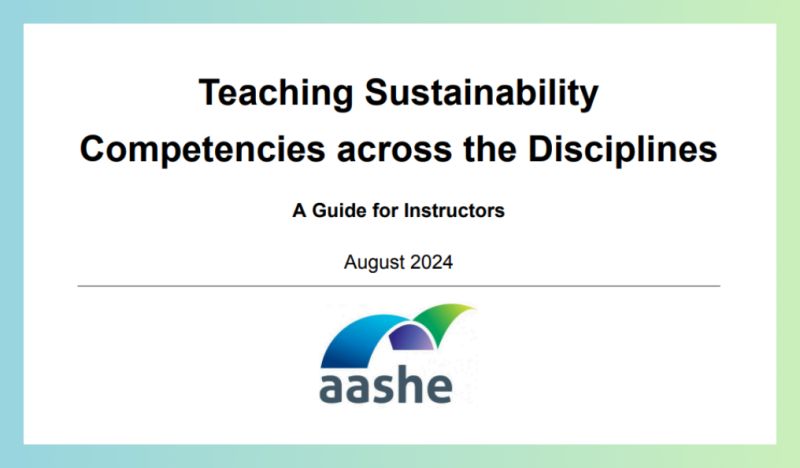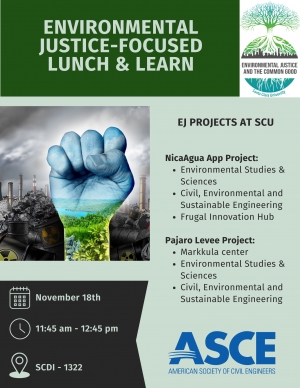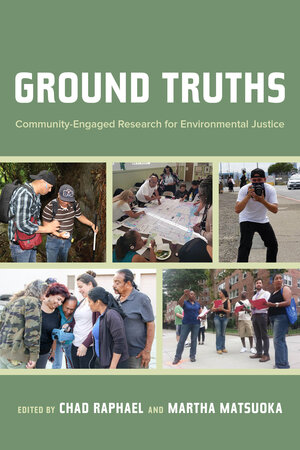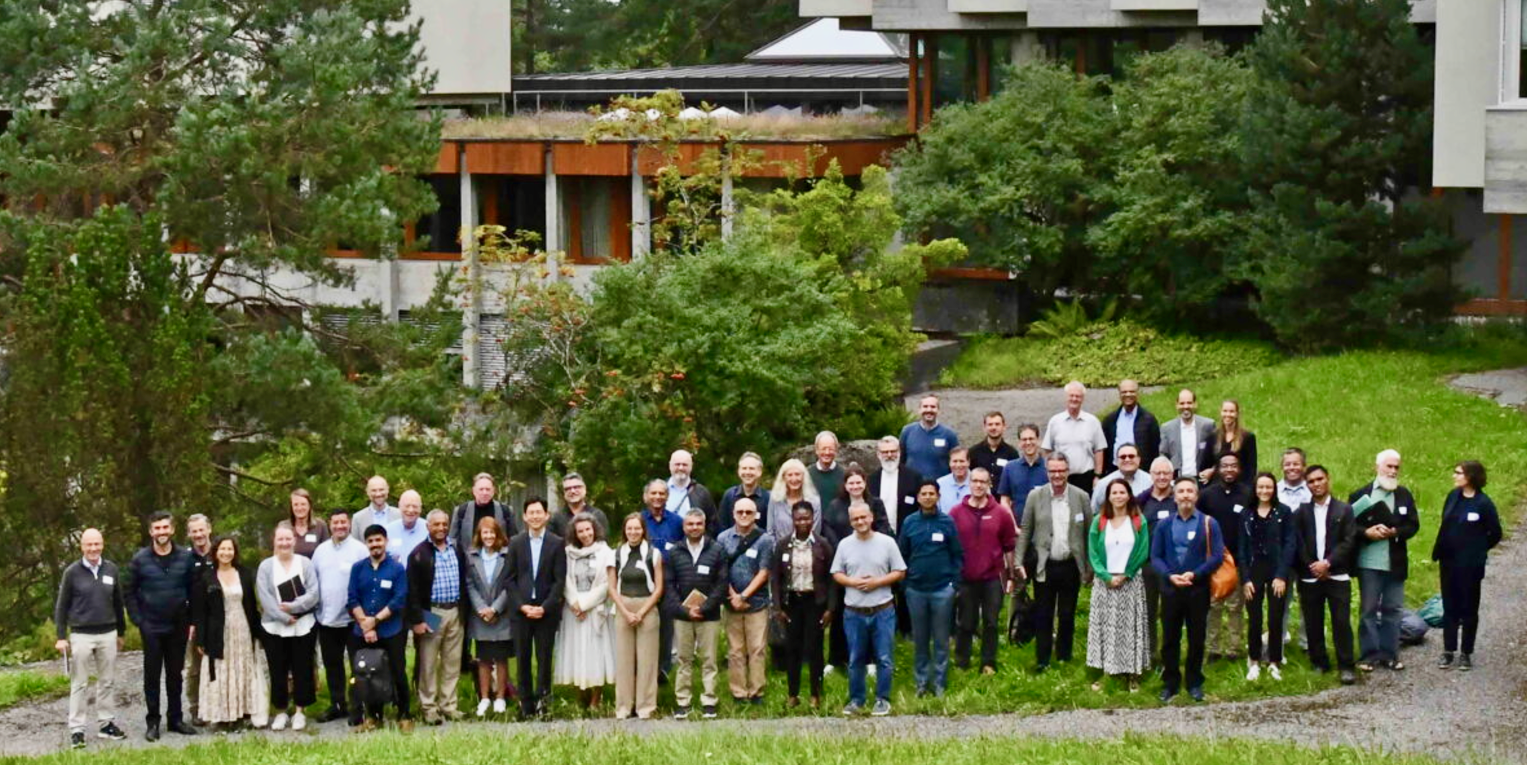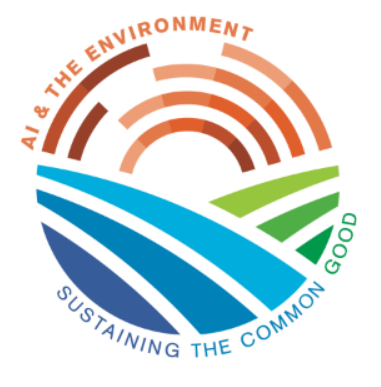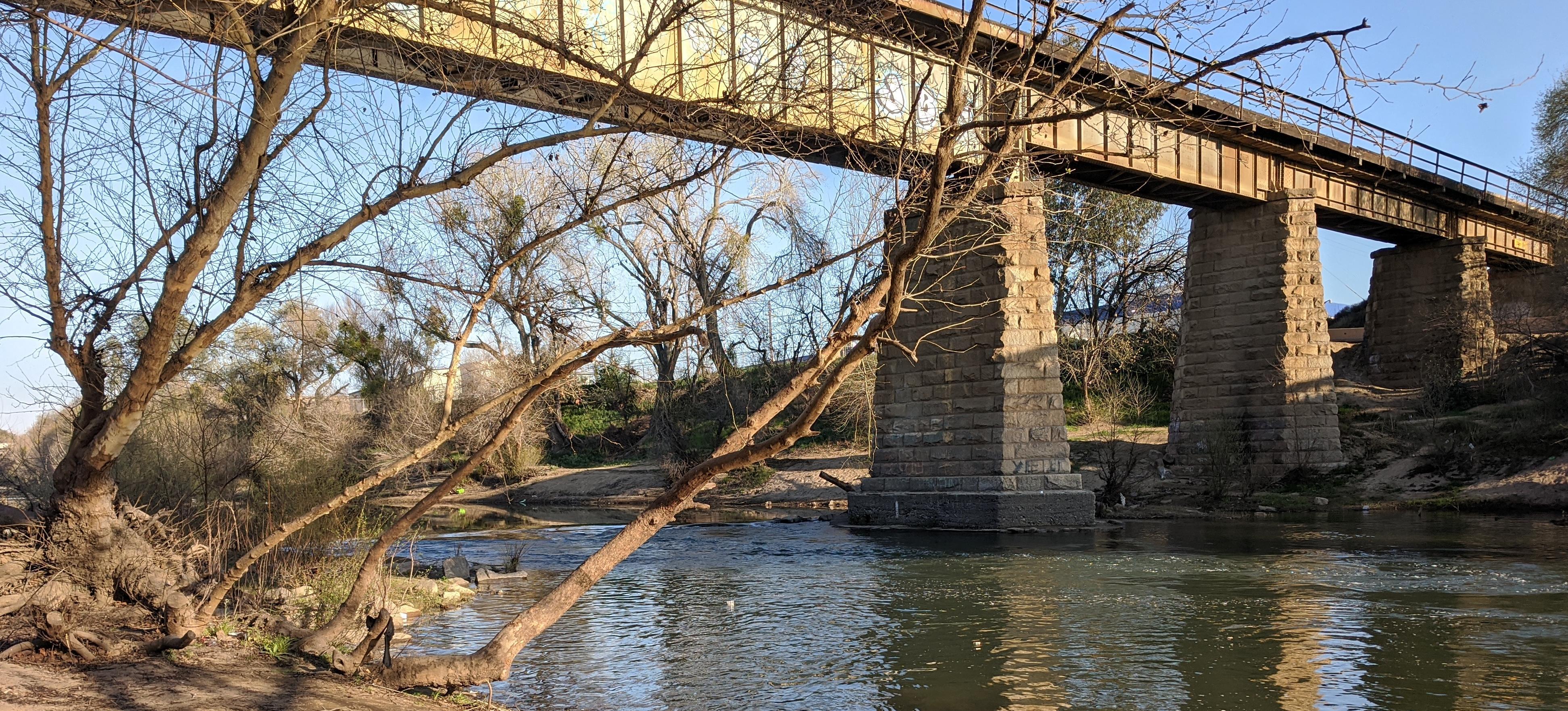| Trouble viewing this email? Read it online. |
| Fall 2024 |
Fostering community-driven research and learning for social and environmental justiceNewsInitiative Contributes to AJCU Faith, Justice, & Reconciliation Assembly
Members of the Initiative played leadership roles in the Laudato Si’ Commission, which presented proposals for expanding learning about integral ecology at the Association of Jesuit Colleges and Universities (AJCU) Assembly, held at Loyola University Chicago on July 16-18. The Assembly is a triennial gathering focusing on how Jesuit higher education institutions can advance justice in all they do. The Initiative’s Christopher Bacon co-chaired the Laudato Si’ Commission, Chad Raphael led the Commission’s subgroup on networking and organized a panel on incorporating integral ecology across the curriculum, and Iris Stewart-Frey organized a panel on fostering environmental & social justice through community-engaged research. Lindsey Kalkbrenner of SCU’s Center for Sustainability also served on the Commission. The Laudato Si’ Commission was one of six charged with envisioning a hope-filled future for Jesuit education by AJCU President and Initiative Advisory Board member Fr. Michael Garanzini, SJ. The Commission conducted an inventory of existing contributions to integral ecology across the AJCUs and issued recommendations for making environmental justice and sustainability a hallmark of Jesuit colleges and universities in their operations, academic affairs, community formation, and civic engagement. Commission members enthusiastically committed to continuing to work together after the Assembly. Initiative Hosts West Coast Summit on Sustainability & Justice in Jesuit and Catholic Secondary Education
The Initiative’s Chad Raphael co-hosted over 30 Jesuit and Catholic secondary school educators at SCU for a summit on incorporating environmental justice and integral ecology across the high school curriculum on June 28-30. Participants learned about promising practices for teaching about sustainability and justice in secondary education, how to make whole-school curricular transformation, connecting with Jesuit and Catholic educational networks and social ministry organizations, and forming professional development networks. SCU’s Center for Sustainability and de Saisset Museum offered environmental justice tours of the campus, and Bellarmine College Prep hosted participants for lunch in their campus garden. The Summit helped participating teachers and administrators move from narrow approaches to sustainability toward education for integral ecology and environmental justice, and from educating about individualistic responses to the sustainability crisis toward educating for systemic understanding and action. The need to address environmental justice in relation to racial and economic justice, and a more inclusive approach to Catholic education, resonated especially with educators from Cristo Rey schools who attended. Co-organized with Michael Downs of Bishop O’Dowd High School and Brenna Davis of the Ignatian Solidarity Network, the summit was generously supported by SCU’s Ignatian Center for Jesuit Education and Inclusive Excellence Division, and John Burns (SCU ‘66). Summer Workshops Train Faculty and Sustainability Officers
In June and July, the Initiative’s Chad Raphael and SCU Center for Sustainability’s Lindsey Kalkbrenner, Veronica Johnson, and Leslie Gray taught three week-long online workshops for 49 faculty and sustainability officers from SCU and 26 other institutions, including many Jesuit and Catholic universities. A grant from the Association for the Advancement of Sustainability in Higher Education (AASHE) supported California Community College instructors to participate for free. Many participants completed multiple workshops, which focused on integrating sustainability and justice across the curriculum, teaching environmental justice and integral ecology, and pedagogy for sustainability and justice. Each workshop included two tracks: one for faculty to design new courses and modules, and one for sustainability officers to design training programs to offer at their own institutions. Participant evaluations highlighted the wealth of resources provided and the value of the individualized feedback from instructors. This professional development program is a collaboration between the initiative’s Laudato Si’ across the Curriculum program and the SCU Center for Sustainability, which is a national training center affiliated with AASHE. Rose Foundation Supports Clean Water Project on Central Coast
State EPA and Water Board Leaders Visit Central Coast to Learn about Drinking Water Contamination
The Initiative’s Iris Stewart-Frey and collaborator Jake Dialesandro from the Water and Climate Justice Lab supported a collaborative effort that included the California Rural Legal Assistance, the Community Water Center, and Monterey Waterkeepers to share experiences and research directly with the U.S. Environmental Protection Agency and drinking water decision makers. On September 30th, EPA Region 9 administrator Martha Guzman, State Water Board Chair Joaquin Esquivel, and State Senator John Laird, among others, met with multiple communities in the Salinas Valley advocating for clean drinking water solutions. Community leaders gave powerful testimonies about the challenges of living with water contaminated by nitrates while emphasizing the critical need for stronger nitrate regulations to prevent further damage to community health. It is critical for decision-makers to meet with residents in the impacted communities, as it makes it easier for local leaders to share their concerns and show people in the EPA and state why we need to strengthen regulations like Agricultural Order 4.0 to protect communities against nitrate contamination across California. Yang and Bacon Respond to SCOTUS Ruling that Threatens Environmental Rules
The Initiative’s Tseming Yang and Christopher Bacon were quoted in an investigative article published in the National Catholic Reporter’s Earthbeat about a recent U.S. Supreme Court decision that could significantly impact federal agencies' ability to implement environmental regulations. In Loper Bright Enterprises v. Raimondo, the court reversed a longstanding precedent known as “the Chevron doctrine,” which required lower courts to defer to federal administrative agencies' interpretation of environmental and other laws. The high court’s ruling allows judges to substitute their interpretations of ambiguities in these statutes for the judgments of the agencies charged with enforcing these laws, including the U.S. Environmental Protection Agency (EPA). Yang helped to set the legal decision in a historical context, and he and Bacon each described how it might allow judges who have less expertise than the EPA to weaken environmental protections. In Our ResearchYouth Organizing and Citizenship
Story Map on the Fight for Clean Water on California’s Central Coast
Building Climate Resilience through Workshops in Nicaragua
As part of the programming held by partner development organization ASDENIC, women producers from the San Luis community of Northern Nicaragua participated in one of several workshops on how to improve climate resilience, including through the use of a forecasting app specifically developed for Nicaragua. The NicaAgua app provides several functionalities that include state-of-the-art global forecasts as well as local knowledge and priorities. The app was created by the Initiative’s Iris Stewart-Frey and collaborators from the Water and Climate Justice Lab in SCU’s Frugal Innovation Hub, School of Engineering, and Web Design. In addition, to advance collaboration between ASDENIC and the Initiative’s Food and Justice Program to promote diversification strategies among small farmers, the San Luis participants visited plots to evaluate the possibility of growing strawberries, turmeric, or ginger. Farm Diversification and Resilience Planning in Nicaragua
The Initiative's Chris Bacon and Maria Eugenia Flores Gomez gave the final presentation of a study on how smallholders diversify their production and adapt to climate change and other hazards to a workshop on farm diversification for food security and resilience in Nicaragua. The research team, which includes SCU Economics Professor Bill Sundstrom and local development organization ASDENIC, offered a participatory presentation that sparked a rich dialogue about how agroecology could inform farm diversification and food system transformation toward food sovereignty. The study’s findings suggested that location was less critical than farmers' surplus subsistence (corn and bean) production, water security, farm size, and income, which all correlated significantly with decreased seasonal hunger. More than 90 local participants from farmer cooperatives, community arts programs, non-profits, and a local university analyzed obstacles to an agroecological transformation, such as persistent challenges accessing sufficient land, water, and food, path dependence (lock-in of conventional systems), disarticulated local markets, the climate crisis, and climate governance failures. Participants from across Nicaragua included National Farmers and Ranchers Union (UNAG), PRODECOOP, COOSMPPROJIN, and Nueva Waslala cooperatives – representing thousands of farmers of corn and beans, vegetables, organic and fair trade coffee, and cacao, and other leaders in agroecology, food security, and sustainable markets, such as Network for Promoting Agroecology (GPAE), as well as SUCO and INTERTEAM, as well as professors and students from the National Autonomous University of Nicaragua. Photo: Raul Diaz New Guide on Teaching Sustainability Competencies across the Curriculum
Chad Raphael and Sarah Young (Communication and Environmental Studies & Sciences ‘24) co-edited Teaching Sustainability Competencies across the Disciplines: A Guide for Instructors. Chad and Sarah coordinated contributions from a dozen staff and faculty members of the Scaling Up Sustainability Across the Curriculum Community of Practice of the Association for the Advancement of Sustainability in Higher Education (AASHE). The guide introduces instructors to the major sustainability competencies (such as systems thinking, future thinking, and ethical thinking), and supports instructors in integrating these competencies into their courses by identifying examples of curricular and pedagogical resources, assessments of student learning, and scholarship of teaching and learning in this field. The guide will be widely used in curriculum development workshops offered to faculty across North America, including SCU’s own summer workshops on sustainability and justice across the curriculum. Recent ProgrammingEnvironmental Justice Lunch & Learn Seminar at SCU School of Engineering
Podcast and Presentation on Community-Engaged Research for Environmental Justice
International Transdisciplinary Research on Making Hope Possible
The Initiative’s Chris Bacon participated in The International Transdisciplinary Biennial on Environmental Justice at Lassalle-Institute (Switzerland) from August 25 to 29, 2024. The conference, which had a competitive abstract submission process, included experts in academia, politics, business, and social development from over twenty countries and focused on making hope tangible by expanding transdisciplinary cooperation in socio-ecological transformation. It is one of the largest Jesuit higher education conferences in Europe. Chris Bacon, with co-author Michael Schuck (Loyola University Chicago), gave a paper that drew on their work as co-chairs of the AJCU’s Laudato Si’ Commission to analyze collective achievements, as well as obstacles and opportunities, for using integral ecology to accelerate cross-institutional cooperation and transformations for sustainability and environmental justice. Chris was also invited to chair a panel featuring speakers from the Xavierian Pontifical University in Colombia and Jesuit Worldwide Learning. Artificial Intelligence and Environmental Justice
In Our TeachingTeaching Advocacy and Organizing on Integral Ecology
On the heels of the 2024 election and in the lead-up to the 10th anniversary of Pope Francis’ encyclical Laudato Si’, the Initiative’s Chad Raphael is collaborating with SCU’s Ignatian Center for Jesuit Education to organize several events and opportunities for faculty and students to integrate advocacy and organizing for integral ecology and environmental justice into the curriculum and co-curriculum.
Partner SpotlightThe Tuolumne River Trust Modesto Office
The Initiative’s Water and Climate program has collaborated with Tuolumne River Trust (TRT) since 2018 to increase access to green spaces and reduce pollution in the historically marginalized communities of Stanislaus County. City green spaces draw people outside and foster interactions, promote healthy habits like walking and playing outdoors, reduce air and water pollution, mitigate the effects of climate change, and increase property values and safety. The lack of green spaces in environmental justice communities contributes to pollution burdens, disparate health outcomes, and lack of economic opportunity. Partnering with TRT, Iris Stewart-Frey and students Chloe Gentile-Montgomery and Meghan Engh used GIS to investigate which neighborhoods lack access to green and park spaces. They have also supported TRT in developing community plans for the conversion of the Carpenter Road parcel, formerly a landfill, into the Tuolumne River Regional Park Master Plan and a string of green spaces along the river that extends into South Modesto. The collaboration designed and executed a survey of residents, determined and mapped the best bike routes, and held community meetings to learn what residents would like to see in their park. However, thriving community parks that serve both the community and the environment require ongoing involvement, care, and education. The TRT Modesto Office, under Central Valley Program Director Hilary Moak, regularly provides these opportunities for youth and adults in and around Modesto that contribute to individual, community, and environmental health. This past summer, the Initiative helped support TRT’s environmental education programming for residents of South Modesto. In July, families and youth explored Caswell State Park and learned about the park's rich history, including the Yokuts tribe that once lived along the Stanislaus River, and gathered acorns. Older youth took a three-day camping and rafting trip on the Tuolumne River, explored riparian zones, and planted native trees to enhance the health of the area. |
| Home | Privacy Policy | Unsubscribe |
Environmental Justice and the Common Good Initiative Santa Clara University 500 El Camino Real Santa Clara, CA 95053 environmentaljustice@scu.edu |

